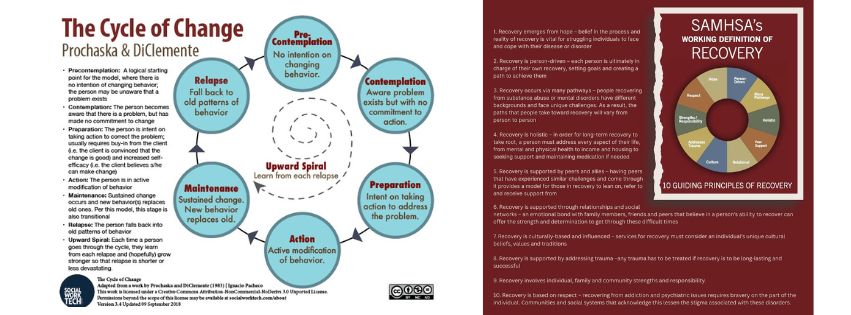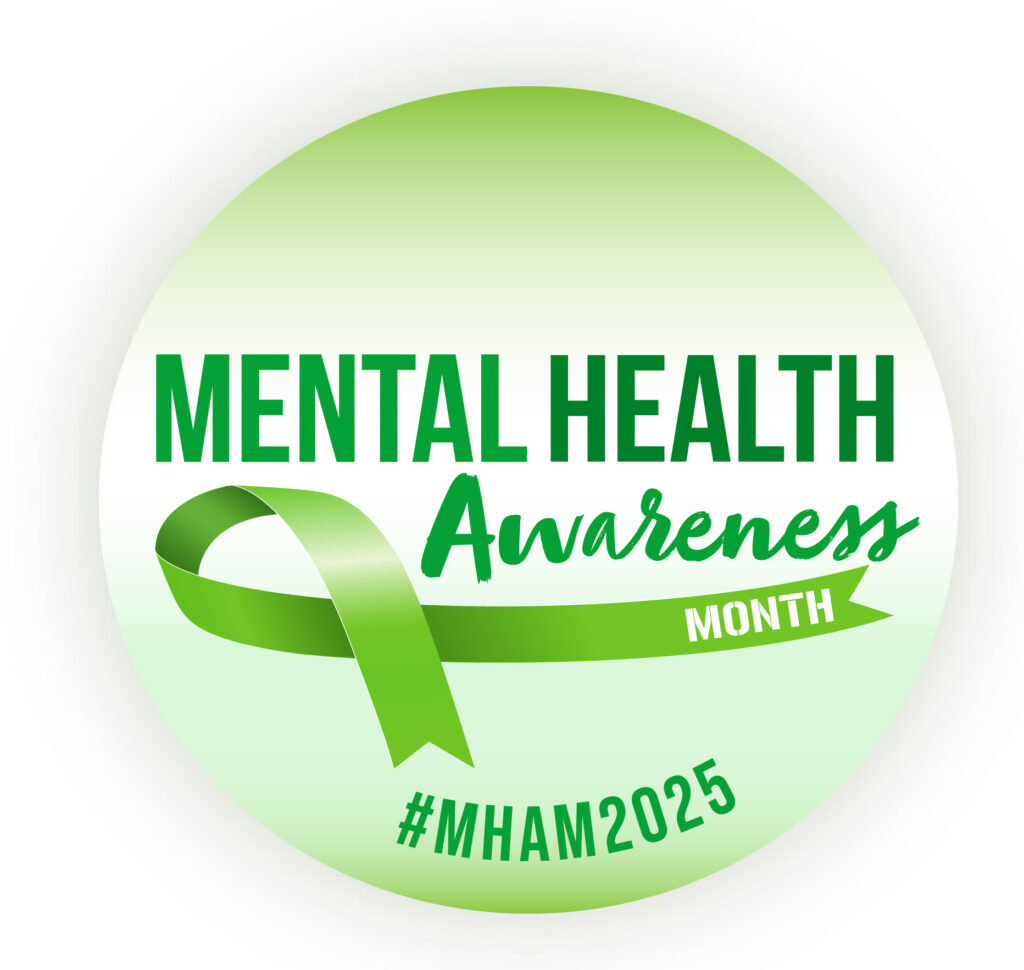Experience, Strength & Hope
May 6, 2025
What parts of your story do you tip toe around, hide or edit? We all do this to some degree. It may be shame, guilt or fear of being judged that keeps us quiet.
Sharing my story including the hardest parts not only helps me heal, but allows me to share hope, show others that recovery is possible and decrease stigma. In support of Mental Health Awareness Month, I’m sharing my story around suicidal ideation, alcohol use disorder and betrayal trauma.
Please dial 988 if you are ever thinking of harming yourself or others.
Suicidal Ideation is the thought process of having ideas or ruminations about the possibility of dying by self-harm. Having these thoughts does not mean a person will take an action to self-harm or end their life, but these thoughts are important to talk about. I felt very hopeless, lost and isolated when I was in these periods of depression and suicidal ideation.
My first experience with having suicidal thoughts were a direct result of my addiction to alcohol. Alcohol Use Disorder (AUD) is the medical term more commonly used today and people with this disorder may or may not be fully dependent on using alcohol. Some people can be on this spectrum situationally. The more regularly a person drinks alcohol the more likely the use will progress. Alcohol use alters brain chemistry. This is just a fact. Our society embraces and markets alcohol which is why it is the 3rd leading cause of preventable deaths and the 2nd most addictive substance in the world.
Stages of Alcohol Use Disorder
Pre-stage Alcohol Use Disorder might be a person that drinks to feel better about themselves. To forget, stop worrying, or eliminate anxiety. Teens and young adults may fall into this category, or they simply have access to alcohol in their homes and see drinking as “fun” or “normal.”
Early-stage Alcohol Use Disorder a person may experience blackouts, begin having hangovers and binge drink. As this stage progresses, lying about drinking, drinking more in quantity due to tolerance, or increasing the number of days they drink. Towards the end of this stage thinking a lot about drinking can occur. “Will I or won’t I drink tonight” is a common thought that can become repetitive with the outcome usually being to drink or irritability if they do not.
Middle-Stage Alcohol Use Disorder is marked by those close to you noticing your drinking patterns, maybe asking you to stop or voicing concern. You might miss work, forget to pick up the kids, feel more anxious or depressed. Physical signs of alcohol use (facial puffiness, weight gain or loss, sluggishness from poor sleep) are common in this stage.
Late-stage Alcohol Use Disorder drinking becomes such an important thing in your life, that your livelihood, your health and your relationships may be severely impacted. Attempts to stop drinking on your own most likely will not be successful or lasting. Many will need outside help at this stage. Physical symptoms from detox can result in tremors or hallucinations.
I was in the pre-stage category of alcohol use in my teens, but in college I moved into the early-stage category and stayed there for probably 10 years. In the middle stage, in my 40s, is where I started having suicidal thoughts. I knew I had a problem, but trying to fix, control and solve it by myself was very lonely and unsuccessful.
I often thought during this time that those I loved would truly be better off without me. I did not have plan for suicide, but I would hope sometimes to be in car accidents when I was alone or to die in some other undefined way. I was unhappy internally but externally everything looked okay. I told no one about any of this, especially not the “wanting to die” part.
In 2017 I went to therapy. It was something I had never tried and it felt like a failure. I believed I not only could solve all my own problems, but was supposed to and defective if I didn’t. In fact, asking for help and talking to someone was the strongest thing I had ever tried. Individual therapy, group therapy and a day treatment program helped me understand my alcohol use, but the underlying anxiety and depression that had begun in childhood had been un-diagnosed. Now I was learning ways to manage anxiety and depression. The dots were connecting and I had been managing those mental health disorders largely with alcohol. Of course, it never really worked and as an addictive substance, the alcohol became its own disorder progressively and slowly over the years.
Periods of sobriety were at times amazing and at other times excruciatingly hard. It all felt uncomfortable. Change is like that. I had relapses over the course of the next four years, and each one felt like massive failure. In 2021 the merry-go-round of “trying” to either live with alcohol or without it was not easy, peaceful or “normal” and I again was contemplating suicidal thoughts. This time the suicide thoughts become more focused and a defined plan formed. Having a plan to end your life and the means to do so is a progression and a potentially dangerous one.
Please dial 988 if you are ever thinking of harming yourself or others.
I knew that if I continued to drink I would either die from alcohol or commit suicide eventually. It truly was a dark, dark time. Luckily for me, I was surrounded by a group of people that talked about these thoughts, shared their stories of recovery and provided me hope. I had been actively participating in a 12-step program for about 2 months, when I truly surrendered to the fact that I could never drink again and a key component for me was surrender and a spiritual connection to a power greater than myself. My sobriety date is October 6, 2021. Everything changed for me this time.
Stages of Change & Principles of Recovery
The Process of Change and Substance Abuse and Mental Health Services

I had two and a half years of sobriety when my suicidal thoughts returned in 2024. This time it was a breach of trust, a betrayal so massive that it was the most painful event of my life (see “Lifequakes”) The one bright spot was I had fundamentally changed in my recovery from alcoholism and drinking was no longer a solution or an option I contemplated. My old coping patterns were broken, and new ones were established. When the suicidal thoughts and plan resurfaced in my thinking and depression, however, it was scary. This time I did something different. I told on myself. I told my doctors, my therapist, my sponsor. No one freaked out, they understood that talking about these thoughts was the safest and healthiest option. They helped me navigate these thoughts and feelings.
Losing my entire identity and the only person I truly loved and trusted was a massive trauma. For a period, I chose to delay the decision when the suicidal thoughts were repetitive and seemed viable. Wait six months was what I told myself. If it’s this bad in six months you can re-visit the suicide idea. I also kept seeing my therapist, my doctor, attending my support group and putting my mental health recovery first in every way possible. I kept talking about everything.
In a session with my therapist where I cried the entire time and told her about my wait six months plan, she gave me a book. It was a memoir. It was the story of betrayal, the shattering and devastation that affairs cause. This woman told my story. Her name is Maggie Smith, and her book is “You Could Make this Place Beautiful.” This book, the hope, the pain and that shared experience led me back to writing and helped me start to move forward in a new way through this trauma.
Six months later I did not need to revisit the suicide thoughts. I had grown into a very different person. I was still grieving the loss of the life I had and that process can take a very long time. I have found ways to carry it differently as I have worked to recover and become a better, more authentic version of myself.
How I healed is much more interesting than how my ex-husband betrayed me by having an affair that blew up our lives. Affairs are common, ordinary in fact. Similar to alcoholism, affairs are so common that society kind of accepts them, ignores them or writes them off as “it happens” or “for the best.” People don’t talk about how painful and complicated the ripple effects are from the destruction they cause. Quite simply I will never be the same again. I’m grateful I had the foundation, resources and support to survive and recover.
I am making my life beautiful. That takes strength, bravery, and honesty. It is special and unique, not common or ordinary. When I tell people what is going on in my life and share those thoughts (no matter how scary) or my experiences (the hard, painful and messy ones) I open the door to recovery and light the path for others to heal.
Please reach out to me if you want to talk. You are not alone.
For more resources, hotlines, warm lines and websites, please visit Mental Health Virginia or NAMI and call 988 if you are in crisis, considering harming yourself or others.
@Reinvention LLC, 2025, All Rights Reserved
